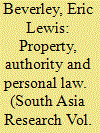| Srl | Item |
| 1 |
ID:
106554


|
|
|
|
|
| Publication |
2011.
|
| Summary/Abstract |
British rule in South Asia transformed the economy and society of the subcontinent, in large part by revamping the status of landed property. Colonial law was founded on the notion that ostensibly religious personal law was outside state jurisdiction. The boundary between state law and personal law, however, was blurry and some elements of 'religious' law had major implications for matters at the core of colonial policy, such as property control. This ambivalence produced a scenario in which legal debates became authorised spaces for colonial subjects to pursue their agendas.
Taking the Muslim charitable trust, or waqf, in late colonial British India, this article argues that advocacy of substantive and procedural changes in waqf laws by Muslim legal activists repre-sented a pointed critique of colonial policies. Through a brief history of the articulation between charitable trusts and colonial property policies, the article draws from the work of two late colo-nial Muslim judges, Syed Ameer Ali and Faiz Badrudin Tyabji, to demonstrate the role waqf debates played in refashioning colonial legal culture. It is suggested that claims about waqf were both instrumental attempts to advance claims to property, and instances for articulating broader ideological critiques of the interpretative authority of British judges.
|
|
|
|
|
|
|
|
|
|
|
|
|
|
|
|
| 2 |
ID:
123067


|
|
|
|
|
| Publication |
2013.
|
| Summary/Abstract |
This paper examines the rise of urban space as locus of intervention, and planning as modality of state power in South Asia from the late nineteenth century to the early post-colonial period. I view these developments through the re-making of Hyderabad, a major metropolis and capital of a sovereign non-colonial state until 1948. The regime's autonomous status made the city a venue for political experimentations informed by varied global and regional circuits. A particular develomentalist idiom fusing an older ideology of ethical patrimonialism and emerging technocratic legitimising rhetorics underwrote planning work in Hyderabad. Tracing urban expansion, housing and infrastructural development, and state-led economic planning schemes, I suggest Hyderabad exemplifies the emergence of a crucial and enduring new form of power in South Asia.
|
|
|
|
|
|
|
|
|
|
|
|
|
|
|
|